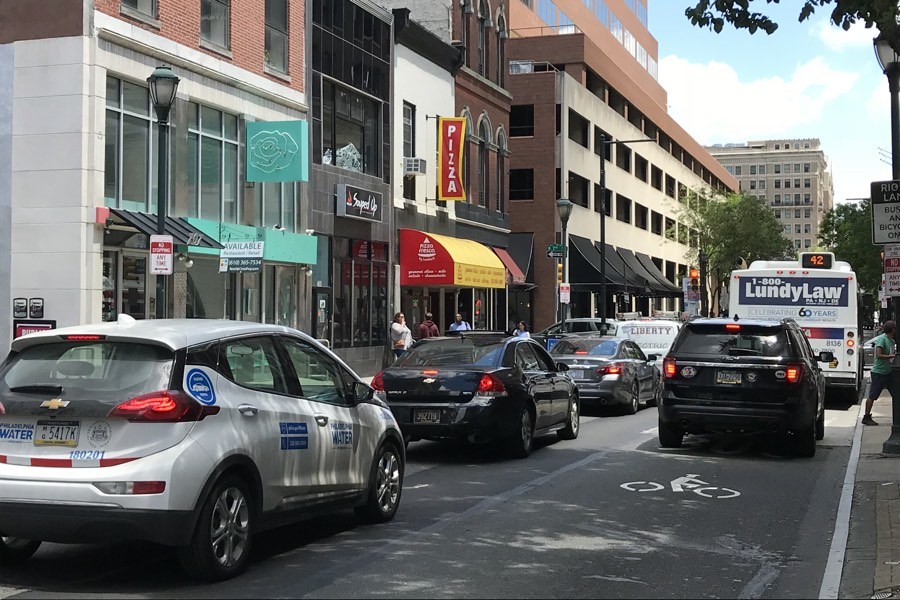Philadelphians Waste More Than a Millennium Sitting in Traffic Every Year
We knew congestion was getting worse in Philly, but this newly released report quantifies just how ghastly (and costly) it's become.

Midday traffic along Chestnut and 7th Streets in Center City. Photo by Ella Comberg.
We’ve all heard stories of (and most likely experienced) horrific traffic here in Philly. We’ve sat in congestion so soul-grinding it’s made us unforgivably late — or maybe even cost us money … or turned our hairs gray. And we’ve repeatedly told traffic tales with flushed faces and steam emerging from our ears, and we’ve sworn something needs to change.
Turns out the city has just validated our anger: Officials shared data this week that quantifies, for the first time, the growing economic cost of congestion in Philly.
The new study, released by Econsult Solutions Inc. on Monday, claims that Philadelphians lose 9.7 million annual hours — or roughly 1,107 years — in Center City bus and car traffic each year. That’s more than a millennium, and if that isn’t enough to make you go buy a bike today, I don’t know what else will do it.
The report defined Center City as the dense downtown area spanning Vine Street to South Street and the Delaware River to the Schuylkill River — 2.3 square miles in total, where an average of 440,000 vehicles travel per day. (Highways weren’t included in the analysis.)
Researchers included two forms of economic losses as a result of Center City congestion: Direct impacts and so-called downstream impacts. The direct impacts, which described “time value and transportation cost losses” to drivers, bus riders and SEPTA, included:
- $152 million in annual time value and transportation costs associated with delays (effectively making for a $260 annual congestion tax on each Philly household)
- $21 million in additional SEPTA bus operating costs associated with maintaining service at slower speeds
While “downstream impacts,” which described potential losses to the city’s economy, tax base and transportation network, encompassed:
- 15,700 potential jobs forgone
- $1.08 billion in potential earnings forgone because of lost productivity (equal to four Comcast Towers worth of unrealized workers, per the report)
- $58 million forgone in City and School District tax revenue because of lower productivity and earnings (equal to $100 per household)
Philadelphians now have more cars than ever — 68,000 more in the last eight years alone, according to CONNECT, the city’s new anti-traffic plan. But it’s not just regular old cars that are responsible for all that traffic: We’ve got ride share vehicles, delivery trucks, construction, sinkholes, repair work and more blocking the way.
Congestion can be a good sign, some say — one of growth and renewed vitality. But apparently traffic is also costing us a whole lot of money, especially when it comes to SEPTA. (And we all know SEPTA can use as much funding as it can get — and then some.)
According the analysis, buses face much longer delays during the city’s most congested hours. While cars see an average delay of 28 percent during rush hour between Monday and Friday in Center City, SEPTA buses see an average delay of 77 percent. That difference leaves lower-income residents to “bear the brunt of the lime losses,” the report states, as commuters are left with the choice of enduring greater delays or switching to more costly modes of transportation — including ride shares or driving.
SEPTA general manager Jeffrey D. Knueppel said congestion delays are “negatively impacting the quality of bus service, which in turn is contributing to ridership loss.”
“Less bus ridership adds even more cars to city streets, further exacerbating the congestion problem,” Knueppel said. “SEPTA is committed to working with the city to breaking this vicious cycle, and this report helps to make clear just how important it is to the future of the city and region that we are successful in this effort.”
Revamping the city’s bus network is one of several pillars laid out in the city’s seven-year plan to cut back on traffic.
The proposal also prioritizes modernizing the city’s trolley networks, as well as increasing bike ridership and ramping up traffic enforcement by raising fines for congestion-causing behaviors, like blocking the box. Last month, residents voted to allow a new class of citizen officers, called public safety enforcement officers, responsible for helping to regulate traffic in Philly.
You can read the full congestion report right here.


